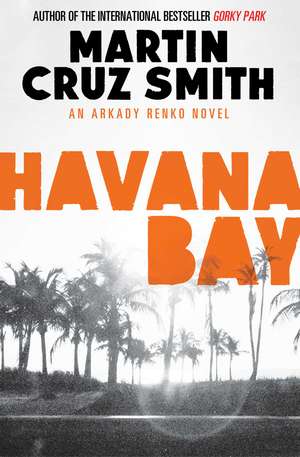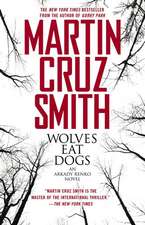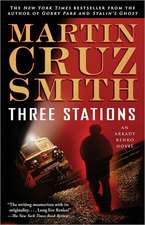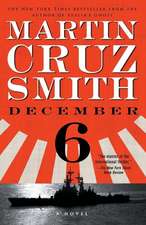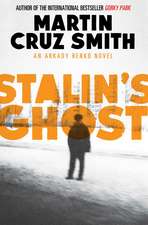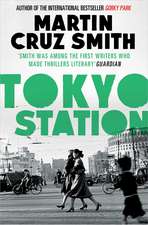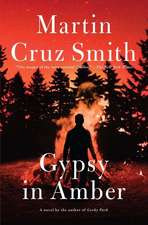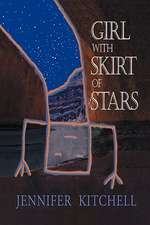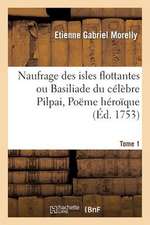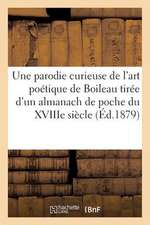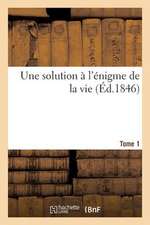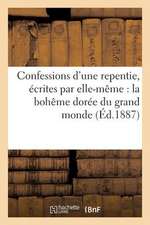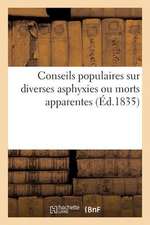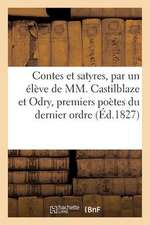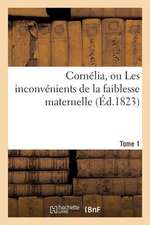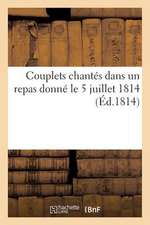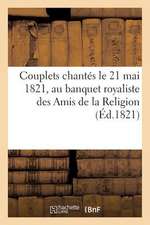Havana Bay: The Arkady Renko Novels, cartea 4
Autor Martin Cruz Smithen Limba Engleză Paperback – 13 mar 2014
AN ARKADY RENKO NOVEL: #4
'One of those writers that anyone who is serious about their craft views with respect bordering on awe' Val McDermid
'Makes tension rise through the page like a shark's fin’ Independent
***
Former Inspector for the Moscow Militsiya, Arkady Renko, is summoned to Cuba to identify a liquefying corpse, dragged from the oily waters of Havana Bay. Renko finds himself in a decaying country, the final recess of Communism - a place where Russia is despised, exotic rituals take precedence and unexpected danger meets bewildering contradictions. After a harrowing experience that has left Renko on the verge of suicide, this new mystery leads him on a trail of deceit that reaches international proportions, and gives him a reason to relish his own life again.
Praise for Martin Cruz Smith
'The story drips with atmosphere and authenticity – a literary triumph' David Young, bestselling author of Stasi Child
'One of those writers that anyone who is serious about their craft views with respect bordering on awe' Val McDermid
‘Cleverly and intelligently told, The Girl from Venice is a truly riveting tale of love, mystery and rampant danger. I loved it’ Kate Furnivall, author of The Liberation
‘Smith not only constructs grittily realistic plots, he also has a gift for characterisation of which most thriller writers can only dream' Mail on Sunday
'Smith was among the first of a new generation of writers who made thrillers literary' Guardian
'Brilliantly worked, marvellously written . . . an imaginative triumph' Sunday Times
‘Martin Cruz Smith’s Renko novels are superb’ William Ryan, author of The Constant Soldier
| Toate formatele și edițiile | Preț | Express |
|---|---|---|
| Paperback (2) | 44.09 lei 23-35 zile | +35.08 lei 6-10 zile |
| Simon & Schuster – 13 mar 2014 | 44.09 lei 23-35 zile | +35.08 lei 6-10 zile |
| BALLANTINE BOOKS – 30 apr 2008 | 108.72 lei 6-8 săpt. |
Preț: 44.09 lei
Preț vechi: 64.92 lei
-32% Nou
Puncte Express: 66
Preț estimativ în valută:
8.44€ • 8.72$ • 7.02£
8.44€ • 8.72$ • 7.02£
Carte disponibilă
Livrare economică 28 februarie-12 martie
Livrare express 11-15 februarie pentru 45.07 lei
Preluare comenzi: 021 569.72.76
Specificații
ISBN-13: 9781471131110
ISBN-10: 1471131114
Pagini: 480
Ilustrații: maps
Dimensiuni: 130 x 198 x 30 mm
Greutate: 0.35 kg
Editura: Simon & Schuster
Colecția Simon & Schuster UK
Seria The Arkady Renko Novels
ISBN-10: 1471131114
Pagini: 480
Ilustrații: maps
Dimensiuni: 130 x 198 x 30 mm
Greutate: 0.35 kg
Editura: Simon & Schuster
Colecția Simon & Schuster UK
Seria The Arkady Renko Novels
Descriere
S&S is delighted to welcome the internationally bestselling author Martin Cruz Smith, the original master of the global thriller
Notă biografică
Martin Cruz Smith is the author of Gorky Park, as well as Stallion Gate, Polar Star, and Rose, among other novels. He lives in California with his wife and three children.
From the Hardcover edition.
From the Hardcover edition.
Extras
A police boat directed a light toward tar-covered pilings and water, turning a black scene white. Havana was invisible across the bay, except for a single line of lamps along the seawall. Stars rode high, anchor lights rode low, otherwise the harbor was a still pool in the night.
Soda cans, crab pots, fishing floats, mattresses, Styrofoam bearded with algae shifted as an investigation team of the Policía Nacional de la Revolución took flash shots. Arkady waited in a cashmere overcoat with a Captain Arcos, a barrel-chested little man who looked ironed into military fatigues, and his Sergeant Luna, large, black and angular. Detective Osorio was a small brown woman in PNR blue; she gave Arkady a studied glare.
A Cuban named Rufo was the interpreter from the Russian embassy. "It's very simple," he translated the captain's words. "You see the body, identify the body and then go home."
"Sounds simple." Arkady tried to be agreeable, although Arcos walked off as if any contact with Russians was contamination.
Osorio combined the sharp features of an ingenue with the grave expression of a hangman. She spoke and Rufo explained, "The detective says this is the Cuban method, not the Russian method or the German method. The Cuban method. You will see."
Arkady had seen little so far. He had just arrived at the airport in the dark when he was whisked away by Rufo. They were headed by taxi to the city when Rufo received a call on a cellular phone that diverted them to the bay. Already Arkady had a sense that he was unwelcome and unpopular.
Rufo wore a loose Hawaiian shirt and a faint resemblance to the older, softer Muhammad Ali. "The detective says she hopes you don't mind learning the Cuban method."
"I'm looking forward to it." Arkady was nothing if not a good guest. "Could you ask her when the body was discovered?"
"Two hours ago by the boat."
"The embassy sent me a message yesterday that Pribluda was in trouble. Why did they say that before you found a body?"
"She says ask the embassy. She was certainly not expecting an investigator."
Professional honor seemed to be at stake and Arkady felt badly outclassed on that score. Like Columbus on deck, Captain Arcos scanned the dark impatiently, Luna his hulking shadow. Osorio had sawhorses erected and stretched a tape that read NO PASEO. When a motorcycle policeman in a white helmet and spurs on his boots arrived, she chased him with a shout that could have scored steel. Somehow men in T-shirts appeared along the tape as soon as it was unrolled-what was it about violent death that was better than dreams? Arkady wondered. Most of the onlookers were black; Havana was far more African than Arkady had expected, although the logos on their shirts were American.
Someone along the tape carried a radio that sang, "La fiesta no es para los feos. Qué feo es, señor. Super feo, amigo mío. No puedes pasar aquí, amigo. La fiesta no es para los feos."
"What does that mean?" Arkady asked Rufo.
"The song? It says, 'This party is not for ugly people. Sorry, my friend, you can't come.' "
Yet here I am, Arkady thought.
A vapor trail far overhead showed silver, and ships at anchor started to appear where only lights had hung moments before. Across the bay the seawall and mansions of Havana rose from the water, docks spread and, along the inner bay, loading cranes got to their feet.
"The captain is sensitive," Rufo said, "but whoever was right or wrong about the message, you're here, the body's here."
"So it couldn't have worked out better?"
"In a manner of speaking."
Osorio ordered the boat to back off so that its wash wouldn't stir the body. A combination of the boat's light and the freshening sky made her face glow.
Rufo said, "Cubans don't like Russians. It's not you, it's just not a good place for a Russian."
"Where is a good place?"
Rufo shrugged.
This side of the harbor, now that Arkady could see it, was like a village. A hillside of banana palms overhung abandoned houses that fronted what was more a cement curb than a seawall that stretched from a coal dock to a ferry landing. A wooden walkway balanced on black pilings captured whatever floated in. The day was going to be warm. He could tell by the smell.
"Vaya a cambiar su cara, amigo. Feo, feo, feo como horror, señor."
In Moscow, in January, the sun would have crept like a dim lamp behind rice paper. Here it was a rushing torch that turned air and bay into mirrors, first of nickel and then to vibrant, undulating pink. Many things were suddenly apparent. A picturesque ferry that moved toward the landing. Little fishing boats moored almost within reach. Arkady noticed that more than palms grew in the village behind him; the sun found coconuts, hibiscus, red and yellow trees. Water around the pilings began to show the peacock sheen of petroleum.
Detective Osorio's order for the video camera to roll was a signal for onlookers to press against the tape. The ferry landing filled with commuters, every face turned toward the pilings where, in the quickening light floated a body as black and bloated as the inner tube it rested in. Shirt and shorts were split by the body's expansion. Hands and feet trailed in the water; a swim fin dangled casually on one foot. The head was eyeless and inflated like a black balloon.
"A neumático," Rufo told Arkady. "A neumático is a fisherman who fishes from an inner tube. Actually from a fishing net spread over the tube. Like a hammock. It's very ingenious, very Cuban."
"The inner tube is his boat?"
"Better than a boat. A boat needs gasoline."
Arkady pondered that proposition.
"Much better."
A diver in a wet suit slid off the police boat while an officer in waders dropped over the seawall. They clambered as much as waded across crab pots and mattress springs, mindful of hidden nails and septic water, and cornered the inner tube so that it wouldn't float away. A net was thrown down from the seawall to stretch under the inner tube and lift it and the body up together. So far, Arkady wouldn't have done anything differently. Sometimes events were just a matter of luck.
The diver stepped into a hole and went under. Gasping, he came up out of the water, grabbed onto first the inner tube and then a foot hanging from it. The foot came off. The inner tube pressed against the spear of a mattress spring, popped and started to deflate. As the foot turned to jelly, Detective Osorio shouted for the officer to toss it to shore: a classic confrontation between authority and vulgar death, Arkady thought. All along the tape, onlookers clapped and laughed.
Rufo said, "See, usually, our level of competence is fairly high, but Russians have this effect. The captain will never forgive you."
The camera went on taping the debacle while another detective jumped into the water. Arkady hoped the lens captured the way the rising sun poured into the windows of the ferry. The inner tube was sinking. An arm disengaged. Shouts flew back and forth between Osorio and the police boat. The more desperately the men in the water tried to save the situation the worse it became. Captain Arcos contributed orders to lift the body. As the diver steadied the head, the pressure of his hands liquefied its face and made it slide like a grape skin off the skull, which itself separated cleanly from the neck; it was like trying to lift a man who was perversely disrobing part by part, unembarrassed by the stench of advanced decomposition. A pelican sailed overhead, red as a flamingo.
"I think identification is going to be a little more complicated than the captain imagined," Arkady said.
The diver caught the jaw as it dropped off from the skull and juggled each, while the detectives pushed the other black, swollen limbs pell-mell into the shriveling inner tube.
"Feo, tan feo. No puedes pasar aquí, amigo. Porque la fiesta no es para los feos."
The rhythm was . . . what was the word? Arkady wondered. Unrelenting.
Across the bay a golden dome seemed to burst into flame, and the houses of the Malecón started to express their unlikely colors of lemon, rose, royal purple, aquamarine.
It really was a lovely city, he thought.
Light from the high windows of the autopsy theater of the Instituto de Medicina Legal fell on three stainless-steel tables. On the right-hand table lay the neumático's torso and loose parts arranged like an ancient statue dredged in pieces from the sea. Along the walls were enamel cabinets, scales, X-ray panel, sink, specimen shelves, freezer, refrigerator, pails. Above, at the observation level, Rufo and Arkady had a semicircle of seats to themselves. Arkady hadn't noticed before how scarred Rufo's brows were.
"Captain Luna would rather you watched from here. The examiner is Dr. Blas."
Rufo waited expectantly until Arkady realized he was supposed to react.
"The Dr. Blas?"
"The very one."
Blas had a dapper Spanish beard and wore rubber gloves, goggles, green scrubs. Only when he appeared satisfied that he had a reasonably complete body did he measure it and search it meticulously for marks and tattoos, a painstaking task when skin tended to slide wherever touched. An autopsy could take two hours, as much as four. At the left-hand table Detective Osorio and a pair of technicians sorted through the deflated inner tube and fishnet; the body had been left tangled in them for fear of disturbing it any more. Captain Arcos stood to one side, Luna a step behind. It occurred to Arkady that Luna's head was as round and blunt as a black fist with red-rimmed eyes. Already Osorio had found a wet roll of American dollar bills and a ring of keys kept in a leaky plastic bag. Fingerprints wouldn't have survived the bag, and she immediately dispatched the keys with an officer. There was something appealingly energetic and fastidious about Osorio. She hung wet shirt, shorts and underwear on hangers on a rack.
While Blas worked he commented to a microphone clipped to the lapel of his coat.
"Maybe two weeks in the water," Rufo translated. He added, "It's been hot and raining, very humid. Even for here."
"You've seen autopsies before?" Arkady asked.
"No, but I've always been curious. And, of course, I'd heard of Dr. Blas."
Performing an autopsy on a body in an advanced stage of putrefaction was as delicate as dissecting a soft-boiled egg. Sex was obvious but not age, not race, not size when the chest and stomach cavities were distended, not weight when the body sagged with water inside, not fingerprints when hands that had trailed in the water for a week ended in digits nibbled to the bone. Then there was the gaseous pressure of chemical change. When Blas punctured the abdomen a flatulent spray shot loudly up, and when he made the Y incision across the chest and then to groin, a wave of black water and liquefied matter overflowed the table. Using a pail, a technician deftly caught the viscera as they floated out. An expanding pong of rot-as if a shovel had been plunged into swamp gas-took possession of the room, invading everyone's nose and mouth. Arkady was glad he had left his precious coat in the car. After the first trauma of the stench-five minutes, no more-the olfactory nerves were traumatized and numb, but he was already digging deep into his cigarettes.
Rufo said, "That smells disgusting."
"Russian tobacco." Arkady filled his lungs with smoke. "Want one?"
"No, thanks. I boxed in Russia when I was on the national team. I hated Moscow. The food, the bread and, most of all, the cigarettes."
"You don't like Russians, either?"
"I love Russians. Some of my best friends are Russian." Rufo leaned for a better view as Blas spread the chest for the camera. "The doctor is very good. At the rate they're going you'll have time to make your plane. You won't even have to spend the night."
"Won't the embassy make a fuss about this?"
"The Russians here? No."
Blas slapped the pulpy mass of the heart in a separate tray.
"You don't think they're too indelicate, I hope," Rufo said.
"Oh, no." To be fair, as Arkady remembered, Pribluda used to root through bodies with the enthusiasm of a boar after nuts. "Imagine the poor bastard's surprise," Pribluda would have said. "Floating around, looking up at the stars, and then bang, he's dead."
Arkady lit one cigarette from another and drew the smoke in sharply enough to make his eyes tear. It occurred to him that he was at a point now where he knew more people dead than alive, the wrong side of a certain line.
"I picked up a lot of languages touring with the team," Rufo said. "After boxing, I used to guide groups of singers, musicians, dancers, intellectuals for the embassy. I miss those days."
Detective Osorio methodically laid out supplies that the dead man had taken to sea: thermos, wicker box, and plastic bags of candles, rolls of tape, twine, hooks and extra line.
Usually, an examiner cut at the hairline and peeled the forehead over the face to reach the skull. Since in this case both the forehead and the face had already slipped off and bade adieu in the bay, Blas proceeded directly with a rotary saw to uncover the brain, which proved rotten with worms that reminded Arkady of the macaroni served by Aeroflot. As the nausea rose he had Rufo lead him to a tiny, chain-flush lavatory, where he threw up, so perhaps he wasn't so inured after all, he thought. Maybe he had just reached his limit. Rufo was gone, and walking back to the autopsy theater on his own, Arkady went by a room perfumed by carboys of formaldehyde and decorated with anatomical charts. On a table two feet with yellow toenails stuck out from a sheet. Between the legs lay an oversized syringe connected by a tube to a tub of embalming fluid on the floor, a technique used in the smallest, most primitive Russian villages when electric pumps failed. The needle of the syringe was particularly long and narrow to fit into an artery, which was thinner than a vein. Between the feet were rubber gloves and another syringe in an unopened plastic bag. Arkady slipped the bag into his jacket pocket.
When Arkady returned to his seat, Rufo was waiting with a recuperative Cuban cigarette. By that time, the brain had been weighed and set aside while Dr. Blas fit head and jaw together.
Although Rufo's lighter was the plastic disposable sort, he said it had been refilled twenty times. "The Cuban record is over a hundred."
Arkady bit the cigarette, inhaled. "What kind is this?"
" 'Popular.' Black tobacco. You like it?"
"It's perfect." Arkady let out a plume of smoke as blue as the exhaust of a car in distress.
Rufo's hand kneaded Arkady's shoulder. "Relax. You're down to bones, my friend."
The officer who had taken the keys from Osorio returned. At the other table, after Blas had measured the skull vertically and across the brow, he spread a handkerchief and diligently scrubbed the teeth with a toothbrush. Arkady handed Rufo a dental chart he had brought from Moscow (an investigator's precaution), and the driver trotted the envelope down to Blas, who systematically matched the skull's brightened grin to the chart's numbered circles. When he was done he conferred with Captain Arcos, who grunted with satisfaction and summoned Arkady down to the theater floor.
Rufo interpreted. "The Russian citizen Sergei Sergeevich Pribluda arrived in Havana eleven months ago as an attaché to the Russian embassy. We knew, of course, that he was a colonel in the KGB. Excuse me, the new Federal Security Service, the SVR."
"Same thing," Arkady said.
The captain-and in his wake, Rufo-went on. "A week ago the embassy informed us that Pribluda was missing. We did not expect them to invite a senior investigator from the Moscow prosecutor's office. Perhaps a family member, nothing more."
Arkady had talked to Pribluda's son, who had refused to come to Havana. He managed a pizzeria, a major responsibility.
Rufo went on. "Fortunately, the captain says, the identification performed today before your eyes is simple and conclusive. The captain says that a key found in the effects was taken to the apartment of the missing man where it unlocked the door. From an examination of the body recovered from the bay, Dr. Blas estimates that it is a Caucasoid male approximately fifty to sixty years of age, 165 centimeters in height, 90 kilos in weight, in every regard the same as the missing man. Moreover, the dental chart of the Russian citizen Pribluda you yourself brought shows one lower molar filled. That molar in the recovered jaw is a steel tooth which, in the opinion of Dr. Blas, according to the captain, is typical Russian dental work. Do you agree?"
"From what I saw, yes."
"Dr. Blas says he finds no wounds or broken bones, no signs of violence or foul play. Your friend died of natural causes, perhaps a stroke or aneurysm or heart attack, it would be almost impossible to determine which for a body in this condition. The doctor hopes he did not suffer long."
"That's kind of him." Although the doctor appeared more smug than sympathetic.
"The captain, for his part, asks if you accept the observations of this autopsy?"
"I'd like to think about it."
"Well, you accept the conclusion that the body recovered is that of the Russian citizen Pribluda?"
Arkady turned to the examining table. What had been a bloated cadaver was now split and gutted. Of course, there had been no face or eyes to identify anyway, and finger bones never did yield prints, but someone had lived in that ruined body.
"I think an inner tube in the bay is a strange place to find a Russian citizen."
"The captain says they all think that."
"Then there will be an investigation?"
Rufo said, "It depends."
"On what?"
"On many factors."
"Such as?"
"The captain says your friend was a spy. What he was doing when he died was not innocent. The captain can predict your embassy will ask us to do nothing. We are the ones who could make an international incident of this, but frankly it is not worth the effort. We will investigate in our own time, in our own way, although in this Special Period the Cuban people cannot afford to waste resources on people who have revealed themselves to be our enemy. Now do you understand what I mean?" Rufo paused while Arcos took a second to compose himself. "The captain says an investigation depends on many factors. The position of our friends at the Russian embassy must be taken into account before premature steps are taken. The only issue we have here is an identification of a foreign national who has died on Cuban territory. Do you accept it is the Russian citizen Sergei Pribluda?"
"It could be," Arkady said.
Dr. Blas sighed, Luna took a deep breath and Detective Osorio weighed the keys in her palm. Arkady couldn't help feeling like a difficult actor. "It probably is, but I can't say conclusively that this body is Pribluda. There's no face, no prints and I doubt very much that you will be able to type the blood. All you have is a dental chart and one steel tooth. He could be another Russian. Or one of thousands of Cubans who went to Russia. Or a Cuban who had a tooth pulled by a Cuban dentist who trained in Russia. Probably you're right, but that's not enough. You opened Pribluda's door with a key. Did you look inside?"
Dr. Blas asked in precisely snipped Russian, "Did you bring any other identification from Moscow?"
"Just this. Pribluda sent it a month ago." Arkady dug out of his passport case a snapshot of three men standing on a beach and squinting at the camera. One man was so black he could have been carved from jet. He held up a glistening rainbow of a fish for the admiration of two whites, a shorter man with a compensating tower of steel-wool hair and, partially obscured by the others, Pribluda. Behind them was water, a tip of beach, palms.
Blas studied the photograph and read the scribble on the back. "Havana Yacht Club."
"There is such a yacht club?" Arkady asked.
"There was such a club before the Revolution," Blas said. "I think your friend was making a joke."
Rufo said, "Cubans love grandiose titles. A 'drinking society' can be friends in a bar."
"The others don't look Russian to me. You can make copies of the picture and circulate them."
The picture went around to Arcos, who put it back into Arkady's hands as if it were toxic. Rufo said, "The captain says your friend was a spy, that spies come to bad ends, as they deserve. This is typically Russian, pretending to help and then stabbing Cuba in the back. The Russian embassy sends out its spy and, when he's missing, asks us to find him. When we find him, you refuse to identify him. Instead of cooperating, you demand an investigation, as if you were still the master and Cuba was the puppet. Since that is no longer the case, you can take your picture back to Moscow. The whole world knows of the Russian betrayal of the Cuban people and, well, he says some more in that vein."
Arkady gathered as much. The captain looked ready to spit.
Rufo gave Arkady a push. "I think it's time to go."
Detective Osorio, who had been quietly following the conversation, suddenly revealed fluent Russian. "Was there a letter with the picture?"
"Only a postcard saying hello," Arkady said. "I threw it away."
"Idiota," Osorio said, which nobody bothered to translate.
"It's lucky you're going home, you don't have many friends here," Rufo said. "The embassy said to put you in an apartment until the plane."
They drove by three-story stone town houses transformed by the revolution into a far more colorful backdrop of ruin and decay, marble colonnades refaced with whatever color was available-green, ultramarine, chartreuse. Not just ordinary green, either, but a vibrant spectrum: sea, lime, palm and verdigris. Houses were as blue as powdered turquoise, pools of water, peeling sky, the upper levels enlivened by balconies of ornate ironwork embellished by canary cages, florid roosters, hanging bicycles. Even dowdy Russian cars wore a wide variety of paint, and if their clothes were drab most of the people had the slow grace and color of big cats. They paused at tables offering guava paste, pastries, tubers and fruits. One girl shaving ices was streaked red and green with syrup, another girl sold sweetmeats from a cheesecloth tent. A locksmith rode a bicycle that powered a key grinder; he wore goggles for the sparks and shavings flying around him as he pedaled in place. The music of a radio hanging in the crook of a pushcart's umbrella floated in the air.
"Is this the way to the airport?" Arkady asked.
"The flight is tomorrow. Usually there's only one Aeroflot flight a week during the winter, so they don't want you to miss it." Rufo rolled the window down. "Phew, I smell worse than fish."
"Autopsies stay with you." Arkady had left his overcoat outside the operating theater and separated the coat now from the paper bag holding Pribluda's effects. "If Dr. Blas and Detective Osorio speak Russian, why were you along?"
"There was a time when it was forbidden to speak English. Now Russian is taboo. Anyway, the embassy wanted someone along when you were with the police, but someone not Russian. You know, I never knew anyone so unpopular so fast as you."
"That's a sort of distinction."
"But now you're here you should enjoy yourself. Would you like to see the city, go to a café, to the Havana Libre? It used to be the Hilton. They have a rooftop restaurant with a fantastic view. And they serve lobster. Only state restaurants are allowed to serve lobster, which are assets of the state."
"No, thanks." The idea of cracking open a lobster after an autopsy didn't sit quite right.
"Or a paladar, a private restaurant. They're small, they're only allowed twelve chairs but the food is much superior. No?"
Perhaps Rufo didn't get a chance to dine out often, but Arkady didn't think he could even watch someone eat.
"No. The major and sergeant were in green uniforms, the detective in gray and blue. Why was that?"
"She's police and they're from the Ministry of the Interior. We just call it Minint. Police are under Minint."
Arkady nodded; in Russia the militia was under the same ministry. "But Arcos and Luna don't usually go out on homicides?"
"I don't think so."
"Why was the captain going on about the Russian embassy?"
"He has a point. In the old days Russians acted like lords. Even now, for Cuban police to ask questions at the embassy takes a diplomatic note. Sometimes the embassy cooperates and sometimes it doesn't."
Most of the traffic was Russian Ladas and Moskviches spraying exhaust and then, waddling as ponderously as dinosaurs, American cars from before the Revolution. Rufo and Arkady got out at a two-story house decorated like a blue Egyptian tomb with scarabs, ankhs and lotuses carved in stucco. A car on blocks sat in residence on the porch.
"'57 Chevrolet." Rufo looked inside at the car's gutted interior, straightened and ran his hand over the flecked paint. From the back. "Tail fins." To the front bumper. "And tits."
From the car key in the bag of effects Arkady knew that Pribluda had a Lada. No breasts on a Russian car.
As they went in and climbed the stairs the door to the ground-floor apartment cracked enough for a woman in a housedress to follow their progress.
"A concierge?" Arkady asked.
"A snoop. Don't worry, at night she watches television and doesn't hear a thing."
"I'm going back tonight."
"That's right." Rufo unlocked the upstairs door. "This is a protocol apartment the embassy uses for visiting dignitaries. Well, lesser dignitaries. I don't think we've had anyone here for a year."
"Is someone from the embassy coming to talk about Pribluda?"
"The only one who wants to talk about Pribluda is you. You like cigars?"
"I've never smoked a cigar."
"We'll talk about it later. I'll be back at midnight to take you to the plane. If you think the flight to Havana was long, wait till you go back to Moscow."
The apartment was furnished with a set of cream-and-gold dining chairs, a sideboard with a coffee service, a nubby sofa, red phone, a bookshelf with titles like La Amistad Russo-Cubana and Fidel y Arte supported by erotic bookends in mahogany. In a disconnected refrigerator a loaf of Bimbo Bread was spotted with mold. The air conditioner was dead and showed the carbon smudges of an electrical fire. Arkady thought he probably showed some carbon smudges of his own.
He stripped from his clothes and showered in a stall of tiles that poured water from every valve and washed the odor of the autopsy off his skin and from his hair. He dried himself on the scrap of towel provided and stretched out on the bed under his overcoat in the dark of the bedroom and listened to the voices and music that filtered from outside through the closed shutters of the window. He dreamed of floating among the playing fish of Havana Bay. He dreamed of flying back to Moscow and not landing, just circling in the night.
Russian planes did that, sometimes, if they were so old that their instruments failed. Although there could be other factors. If a pilot made a second landing approach he could be charged for the extra fuel expended, so he made only one, good or not. Or they were overloaded or underfueled.
He was both.
Circling sounded good.
From the Hardcover edition.
Soda cans, crab pots, fishing floats, mattresses, Styrofoam bearded with algae shifted as an investigation team of the Policía Nacional de la Revolución took flash shots. Arkady waited in a cashmere overcoat with a Captain Arcos, a barrel-chested little man who looked ironed into military fatigues, and his Sergeant Luna, large, black and angular. Detective Osorio was a small brown woman in PNR blue; she gave Arkady a studied glare.
A Cuban named Rufo was the interpreter from the Russian embassy. "It's very simple," he translated the captain's words. "You see the body, identify the body and then go home."
"Sounds simple." Arkady tried to be agreeable, although Arcos walked off as if any contact with Russians was contamination.
Osorio combined the sharp features of an ingenue with the grave expression of a hangman. She spoke and Rufo explained, "The detective says this is the Cuban method, not the Russian method or the German method. The Cuban method. You will see."
Arkady had seen little so far. He had just arrived at the airport in the dark when he was whisked away by Rufo. They were headed by taxi to the city when Rufo received a call on a cellular phone that diverted them to the bay. Already Arkady had a sense that he was unwelcome and unpopular.
Rufo wore a loose Hawaiian shirt and a faint resemblance to the older, softer Muhammad Ali. "The detective says she hopes you don't mind learning the Cuban method."
"I'm looking forward to it." Arkady was nothing if not a good guest. "Could you ask her when the body was discovered?"
"Two hours ago by the boat."
"The embassy sent me a message yesterday that Pribluda was in trouble. Why did they say that before you found a body?"
"She says ask the embassy. She was certainly not expecting an investigator."
Professional honor seemed to be at stake and Arkady felt badly outclassed on that score. Like Columbus on deck, Captain Arcos scanned the dark impatiently, Luna his hulking shadow. Osorio had sawhorses erected and stretched a tape that read NO PASEO. When a motorcycle policeman in a white helmet and spurs on his boots arrived, she chased him with a shout that could have scored steel. Somehow men in T-shirts appeared along the tape as soon as it was unrolled-what was it about violent death that was better than dreams? Arkady wondered. Most of the onlookers were black; Havana was far more African than Arkady had expected, although the logos on their shirts were American.
Someone along the tape carried a radio that sang, "La fiesta no es para los feos. Qué feo es, señor. Super feo, amigo mío. No puedes pasar aquí, amigo. La fiesta no es para los feos."
"What does that mean?" Arkady asked Rufo.
"The song? It says, 'This party is not for ugly people. Sorry, my friend, you can't come.' "
Yet here I am, Arkady thought.
A vapor trail far overhead showed silver, and ships at anchor started to appear where only lights had hung moments before. Across the bay the seawall and mansions of Havana rose from the water, docks spread and, along the inner bay, loading cranes got to their feet.
"The captain is sensitive," Rufo said, "but whoever was right or wrong about the message, you're here, the body's here."
"So it couldn't have worked out better?"
"In a manner of speaking."
Osorio ordered the boat to back off so that its wash wouldn't stir the body. A combination of the boat's light and the freshening sky made her face glow.
Rufo said, "Cubans don't like Russians. It's not you, it's just not a good place for a Russian."
"Where is a good place?"
Rufo shrugged.
This side of the harbor, now that Arkady could see it, was like a village. A hillside of banana palms overhung abandoned houses that fronted what was more a cement curb than a seawall that stretched from a coal dock to a ferry landing. A wooden walkway balanced on black pilings captured whatever floated in. The day was going to be warm. He could tell by the smell.
"Vaya a cambiar su cara, amigo. Feo, feo, feo como horror, señor."
In Moscow, in January, the sun would have crept like a dim lamp behind rice paper. Here it was a rushing torch that turned air and bay into mirrors, first of nickel and then to vibrant, undulating pink. Many things were suddenly apparent. A picturesque ferry that moved toward the landing. Little fishing boats moored almost within reach. Arkady noticed that more than palms grew in the village behind him; the sun found coconuts, hibiscus, red and yellow trees. Water around the pilings began to show the peacock sheen of petroleum.
Detective Osorio's order for the video camera to roll was a signal for onlookers to press against the tape. The ferry landing filled with commuters, every face turned toward the pilings where, in the quickening light floated a body as black and bloated as the inner tube it rested in. Shirt and shorts were split by the body's expansion. Hands and feet trailed in the water; a swim fin dangled casually on one foot. The head was eyeless and inflated like a black balloon.
"A neumático," Rufo told Arkady. "A neumático is a fisherman who fishes from an inner tube. Actually from a fishing net spread over the tube. Like a hammock. It's very ingenious, very Cuban."
"The inner tube is his boat?"
"Better than a boat. A boat needs gasoline."
Arkady pondered that proposition.
"Much better."
A diver in a wet suit slid off the police boat while an officer in waders dropped over the seawall. They clambered as much as waded across crab pots and mattress springs, mindful of hidden nails and septic water, and cornered the inner tube so that it wouldn't float away. A net was thrown down from the seawall to stretch under the inner tube and lift it and the body up together. So far, Arkady wouldn't have done anything differently. Sometimes events were just a matter of luck.
The diver stepped into a hole and went under. Gasping, he came up out of the water, grabbed onto first the inner tube and then a foot hanging from it. The foot came off. The inner tube pressed against the spear of a mattress spring, popped and started to deflate. As the foot turned to jelly, Detective Osorio shouted for the officer to toss it to shore: a classic confrontation between authority and vulgar death, Arkady thought. All along the tape, onlookers clapped and laughed.
Rufo said, "See, usually, our level of competence is fairly high, but Russians have this effect. The captain will never forgive you."
The camera went on taping the debacle while another detective jumped into the water. Arkady hoped the lens captured the way the rising sun poured into the windows of the ferry. The inner tube was sinking. An arm disengaged. Shouts flew back and forth between Osorio and the police boat. The more desperately the men in the water tried to save the situation the worse it became. Captain Arcos contributed orders to lift the body. As the diver steadied the head, the pressure of his hands liquefied its face and made it slide like a grape skin off the skull, which itself separated cleanly from the neck; it was like trying to lift a man who was perversely disrobing part by part, unembarrassed by the stench of advanced decomposition. A pelican sailed overhead, red as a flamingo.
"I think identification is going to be a little more complicated than the captain imagined," Arkady said.
The diver caught the jaw as it dropped off from the skull and juggled each, while the detectives pushed the other black, swollen limbs pell-mell into the shriveling inner tube.
"Feo, tan feo. No puedes pasar aquí, amigo. Porque la fiesta no es para los feos."
The rhythm was . . . what was the word? Arkady wondered. Unrelenting.
Across the bay a golden dome seemed to burst into flame, and the houses of the Malecón started to express their unlikely colors of lemon, rose, royal purple, aquamarine.
It really was a lovely city, he thought.
Light from the high windows of the autopsy theater of the Instituto de Medicina Legal fell on three stainless-steel tables. On the right-hand table lay the neumático's torso and loose parts arranged like an ancient statue dredged in pieces from the sea. Along the walls were enamel cabinets, scales, X-ray panel, sink, specimen shelves, freezer, refrigerator, pails. Above, at the observation level, Rufo and Arkady had a semicircle of seats to themselves. Arkady hadn't noticed before how scarred Rufo's brows were.
"Captain Luna would rather you watched from here. The examiner is Dr. Blas."
Rufo waited expectantly until Arkady realized he was supposed to react.
"The Dr. Blas?"
"The very one."
Blas had a dapper Spanish beard and wore rubber gloves, goggles, green scrubs. Only when he appeared satisfied that he had a reasonably complete body did he measure it and search it meticulously for marks and tattoos, a painstaking task when skin tended to slide wherever touched. An autopsy could take two hours, as much as four. At the left-hand table Detective Osorio and a pair of technicians sorted through the deflated inner tube and fishnet; the body had been left tangled in them for fear of disturbing it any more. Captain Arcos stood to one side, Luna a step behind. It occurred to Arkady that Luna's head was as round and blunt as a black fist with red-rimmed eyes. Already Osorio had found a wet roll of American dollar bills and a ring of keys kept in a leaky plastic bag. Fingerprints wouldn't have survived the bag, and she immediately dispatched the keys with an officer. There was something appealingly energetic and fastidious about Osorio. She hung wet shirt, shorts and underwear on hangers on a rack.
While Blas worked he commented to a microphone clipped to the lapel of his coat.
"Maybe two weeks in the water," Rufo translated. He added, "It's been hot and raining, very humid. Even for here."
"You've seen autopsies before?" Arkady asked.
"No, but I've always been curious. And, of course, I'd heard of Dr. Blas."
Performing an autopsy on a body in an advanced stage of putrefaction was as delicate as dissecting a soft-boiled egg. Sex was obvious but not age, not race, not size when the chest and stomach cavities were distended, not weight when the body sagged with water inside, not fingerprints when hands that had trailed in the water for a week ended in digits nibbled to the bone. Then there was the gaseous pressure of chemical change. When Blas punctured the abdomen a flatulent spray shot loudly up, and when he made the Y incision across the chest and then to groin, a wave of black water and liquefied matter overflowed the table. Using a pail, a technician deftly caught the viscera as they floated out. An expanding pong of rot-as if a shovel had been plunged into swamp gas-took possession of the room, invading everyone's nose and mouth. Arkady was glad he had left his precious coat in the car. After the first trauma of the stench-five minutes, no more-the olfactory nerves were traumatized and numb, but he was already digging deep into his cigarettes.
Rufo said, "That smells disgusting."
"Russian tobacco." Arkady filled his lungs with smoke. "Want one?"
"No, thanks. I boxed in Russia when I was on the national team. I hated Moscow. The food, the bread and, most of all, the cigarettes."
"You don't like Russians, either?"
"I love Russians. Some of my best friends are Russian." Rufo leaned for a better view as Blas spread the chest for the camera. "The doctor is very good. At the rate they're going you'll have time to make your plane. You won't even have to spend the night."
"Won't the embassy make a fuss about this?"
"The Russians here? No."
Blas slapped the pulpy mass of the heart in a separate tray.
"You don't think they're too indelicate, I hope," Rufo said.
"Oh, no." To be fair, as Arkady remembered, Pribluda used to root through bodies with the enthusiasm of a boar after nuts. "Imagine the poor bastard's surprise," Pribluda would have said. "Floating around, looking up at the stars, and then bang, he's dead."
Arkady lit one cigarette from another and drew the smoke in sharply enough to make his eyes tear. It occurred to him that he was at a point now where he knew more people dead than alive, the wrong side of a certain line.
"I picked up a lot of languages touring with the team," Rufo said. "After boxing, I used to guide groups of singers, musicians, dancers, intellectuals for the embassy. I miss those days."
Detective Osorio methodically laid out supplies that the dead man had taken to sea: thermos, wicker box, and plastic bags of candles, rolls of tape, twine, hooks and extra line.
Usually, an examiner cut at the hairline and peeled the forehead over the face to reach the skull. Since in this case both the forehead and the face had already slipped off and bade adieu in the bay, Blas proceeded directly with a rotary saw to uncover the brain, which proved rotten with worms that reminded Arkady of the macaroni served by Aeroflot. As the nausea rose he had Rufo lead him to a tiny, chain-flush lavatory, where he threw up, so perhaps he wasn't so inured after all, he thought. Maybe he had just reached his limit. Rufo was gone, and walking back to the autopsy theater on his own, Arkady went by a room perfumed by carboys of formaldehyde and decorated with anatomical charts. On a table two feet with yellow toenails stuck out from a sheet. Between the legs lay an oversized syringe connected by a tube to a tub of embalming fluid on the floor, a technique used in the smallest, most primitive Russian villages when electric pumps failed. The needle of the syringe was particularly long and narrow to fit into an artery, which was thinner than a vein. Between the feet were rubber gloves and another syringe in an unopened plastic bag. Arkady slipped the bag into his jacket pocket.
When Arkady returned to his seat, Rufo was waiting with a recuperative Cuban cigarette. By that time, the brain had been weighed and set aside while Dr. Blas fit head and jaw together.
Although Rufo's lighter was the plastic disposable sort, he said it had been refilled twenty times. "The Cuban record is over a hundred."
Arkady bit the cigarette, inhaled. "What kind is this?"
" 'Popular.' Black tobacco. You like it?"
"It's perfect." Arkady let out a plume of smoke as blue as the exhaust of a car in distress.
Rufo's hand kneaded Arkady's shoulder. "Relax. You're down to bones, my friend."
The officer who had taken the keys from Osorio returned. At the other table, after Blas had measured the skull vertically and across the brow, he spread a handkerchief and diligently scrubbed the teeth with a toothbrush. Arkady handed Rufo a dental chart he had brought from Moscow (an investigator's precaution), and the driver trotted the envelope down to Blas, who systematically matched the skull's brightened grin to the chart's numbered circles. When he was done he conferred with Captain Arcos, who grunted with satisfaction and summoned Arkady down to the theater floor.
Rufo interpreted. "The Russian citizen Sergei Sergeevich Pribluda arrived in Havana eleven months ago as an attaché to the Russian embassy. We knew, of course, that he was a colonel in the KGB. Excuse me, the new Federal Security Service, the SVR."
"Same thing," Arkady said.
The captain-and in his wake, Rufo-went on. "A week ago the embassy informed us that Pribluda was missing. We did not expect them to invite a senior investigator from the Moscow prosecutor's office. Perhaps a family member, nothing more."
Arkady had talked to Pribluda's son, who had refused to come to Havana. He managed a pizzeria, a major responsibility.
Rufo went on. "Fortunately, the captain says, the identification performed today before your eyes is simple and conclusive. The captain says that a key found in the effects was taken to the apartment of the missing man where it unlocked the door. From an examination of the body recovered from the bay, Dr. Blas estimates that it is a Caucasoid male approximately fifty to sixty years of age, 165 centimeters in height, 90 kilos in weight, in every regard the same as the missing man. Moreover, the dental chart of the Russian citizen Pribluda you yourself brought shows one lower molar filled. That molar in the recovered jaw is a steel tooth which, in the opinion of Dr. Blas, according to the captain, is typical Russian dental work. Do you agree?"
"From what I saw, yes."
"Dr. Blas says he finds no wounds or broken bones, no signs of violence or foul play. Your friend died of natural causes, perhaps a stroke or aneurysm or heart attack, it would be almost impossible to determine which for a body in this condition. The doctor hopes he did not suffer long."
"That's kind of him." Although the doctor appeared more smug than sympathetic.
"The captain, for his part, asks if you accept the observations of this autopsy?"
"I'd like to think about it."
"Well, you accept the conclusion that the body recovered is that of the Russian citizen Pribluda?"
Arkady turned to the examining table. What had been a bloated cadaver was now split and gutted. Of course, there had been no face or eyes to identify anyway, and finger bones never did yield prints, but someone had lived in that ruined body.
"I think an inner tube in the bay is a strange place to find a Russian citizen."
"The captain says they all think that."
"Then there will be an investigation?"
Rufo said, "It depends."
"On what?"
"On many factors."
"Such as?"
"The captain says your friend was a spy. What he was doing when he died was not innocent. The captain can predict your embassy will ask us to do nothing. We are the ones who could make an international incident of this, but frankly it is not worth the effort. We will investigate in our own time, in our own way, although in this Special Period the Cuban people cannot afford to waste resources on people who have revealed themselves to be our enemy. Now do you understand what I mean?" Rufo paused while Arcos took a second to compose himself. "The captain says an investigation depends on many factors. The position of our friends at the Russian embassy must be taken into account before premature steps are taken. The only issue we have here is an identification of a foreign national who has died on Cuban territory. Do you accept it is the Russian citizen Sergei Pribluda?"
"It could be," Arkady said.
Dr. Blas sighed, Luna took a deep breath and Detective Osorio weighed the keys in her palm. Arkady couldn't help feeling like a difficult actor. "It probably is, but I can't say conclusively that this body is Pribluda. There's no face, no prints and I doubt very much that you will be able to type the blood. All you have is a dental chart and one steel tooth. He could be another Russian. Or one of thousands of Cubans who went to Russia. Or a Cuban who had a tooth pulled by a Cuban dentist who trained in Russia. Probably you're right, but that's not enough. You opened Pribluda's door with a key. Did you look inside?"
Dr. Blas asked in precisely snipped Russian, "Did you bring any other identification from Moscow?"
"Just this. Pribluda sent it a month ago." Arkady dug out of his passport case a snapshot of three men standing on a beach and squinting at the camera. One man was so black he could have been carved from jet. He held up a glistening rainbow of a fish for the admiration of two whites, a shorter man with a compensating tower of steel-wool hair and, partially obscured by the others, Pribluda. Behind them was water, a tip of beach, palms.
Blas studied the photograph and read the scribble on the back. "Havana Yacht Club."
"There is such a yacht club?" Arkady asked.
"There was such a club before the Revolution," Blas said. "I think your friend was making a joke."
Rufo said, "Cubans love grandiose titles. A 'drinking society' can be friends in a bar."
"The others don't look Russian to me. You can make copies of the picture and circulate them."
The picture went around to Arcos, who put it back into Arkady's hands as if it were toxic. Rufo said, "The captain says your friend was a spy, that spies come to bad ends, as they deserve. This is typically Russian, pretending to help and then stabbing Cuba in the back. The Russian embassy sends out its spy and, when he's missing, asks us to find him. When we find him, you refuse to identify him. Instead of cooperating, you demand an investigation, as if you were still the master and Cuba was the puppet. Since that is no longer the case, you can take your picture back to Moscow. The whole world knows of the Russian betrayal of the Cuban people and, well, he says some more in that vein."
Arkady gathered as much. The captain looked ready to spit.
Rufo gave Arkady a push. "I think it's time to go."
Detective Osorio, who had been quietly following the conversation, suddenly revealed fluent Russian. "Was there a letter with the picture?"
"Only a postcard saying hello," Arkady said. "I threw it away."
"Idiota," Osorio said, which nobody bothered to translate.
"It's lucky you're going home, you don't have many friends here," Rufo said. "The embassy said to put you in an apartment until the plane."
They drove by three-story stone town houses transformed by the revolution into a far more colorful backdrop of ruin and decay, marble colonnades refaced with whatever color was available-green, ultramarine, chartreuse. Not just ordinary green, either, but a vibrant spectrum: sea, lime, palm and verdigris. Houses were as blue as powdered turquoise, pools of water, peeling sky, the upper levels enlivened by balconies of ornate ironwork embellished by canary cages, florid roosters, hanging bicycles. Even dowdy Russian cars wore a wide variety of paint, and if their clothes were drab most of the people had the slow grace and color of big cats. They paused at tables offering guava paste, pastries, tubers and fruits. One girl shaving ices was streaked red and green with syrup, another girl sold sweetmeats from a cheesecloth tent. A locksmith rode a bicycle that powered a key grinder; he wore goggles for the sparks and shavings flying around him as he pedaled in place. The music of a radio hanging in the crook of a pushcart's umbrella floated in the air.
"Is this the way to the airport?" Arkady asked.
"The flight is tomorrow. Usually there's only one Aeroflot flight a week during the winter, so they don't want you to miss it." Rufo rolled the window down. "Phew, I smell worse than fish."
"Autopsies stay with you." Arkady had left his overcoat outside the operating theater and separated the coat now from the paper bag holding Pribluda's effects. "If Dr. Blas and Detective Osorio speak Russian, why were you along?"
"There was a time when it was forbidden to speak English. Now Russian is taboo. Anyway, the embassy wanted someone along when you were with the police, but someone not Russian. You know, I never knew anyone so unpopular so fast as you."
"That's a sort of distinction."
"But now you're here you should enjoy yourself. Would you like to see the city, go to a café, to the Havana Libre? It used to be the Hilton. They have a rooftop restaurant with a fantastic view. And they serve lobster. Only state restaurants are allowed to serve lobster, which are assets of the state."
"No, thanks." The idea of cracking open a lobster after an autopsy didn't sit quite right.
"Or a paladar, a private restaurant. They're small, they're only allowed twelve chairs but the food is much superior. No?"
Perhaps Rufo didn't get a chance to dine out often, but Arkady didn't think he could even watch someone eat.
"No. The major and sergeant were in green uniforms, the detective in gray and blue. Why was that?"
"She's police and they're from the Ministry of the Interior. We just call it Minint. Police are under Minint."
Arkady nodded; in Russia the militia was under the same ministry. "But Arcos and Luna don't usually go out on homicides?"
"I don't think so."
"Why was the captain going on about the Russian embassy?"
"He has a point. In the old days Russians acted like lords. Even now, for Cuban police to ask questions at the embassy takes a diplomatic note. Sometimes the embassy cooperates and sometimes it doesn't."
Most of the traffic was Russian Ladas and Moskviches spraying exhaust and then, waddling as ponderously as dinosaurs, American cars from before the Revolution. Rufo and Arkady got out at a two-story house decorated like a blue Egyptian tomb with scarabs, ankhs and lotuses carved in stucco. A car on blocks sat in residence on the porch.
"'57 Chevrolet." Rufo looked inside at the car's gutted interior, straightened and ran his hand over the flecked paint. From the back. "Tail fins." To the front bumper. "And tits."
From the car key in the bag of effects Arkady knew that Pribluda had a Lada. No breasts on a Russian car.
As they went in and climbed the stairs the door to the ground-floor apartment cracked enough for a woman in a housedress to follow their progress.
"A concierge?" Arkady asked.
"A snoop. Don't worry, at night she watches television and doesn't hear a thing."
"I'm going back tonight."
"That's right." Rufo unlocked the upstairs door. "This is a protocol apartment the embassy uses for visiting dignitaries. Well, lesser dignitaries. I don't think we've had anyone here for a year."
"Is someone from the embassy coming to talk about Pribluda?"
"The only one who wants to talk about Pribluda is you. You like cigars?"
"I've never smoked a cigar."
"We'll talk about it later. I'll be back at midnight to take you to the plane. If you think the flight to Havana was long, wait till you go back to Moscow."
The apartment was furnished with a set of cream-and-gold dining chairs, a sideboard with a coffee service, a nubby sofa, red phone, a bookshelf with titles like La Amistad Russo-Cubana and Fidel y Arte supported by erotic bookends in mahogany. In a disconnected refrigerator a loaf of Bimbo Bread was spotted with mold. The air conditioner was dead and showed the carbon smudges of an electrical fire. Arkady thought he probably showed some carbon smudges of his own.
He stripped from his clothes and showered in a stall of tiles that poured water from every valve and washed the odor of the autopsy off his skin and from his hair. He dried himself on the scrap of towel provided and stretched out on the bed under his overcoat in the dark of the bedroom and listened to the voices and music that filtered from outside through the closed shutters of the window. He dreamed of floating among the playing fish of Havana Bay. He dreamed of flying back to Moscow and not landing, just circling in the night.
Russian planes did that, sometimes, if they were so old that their instruments failed. Although there could be other factors. If a pilot made a second landing approach he could be charged for the extra fuel expended, so he made only one, good or not. Or they were overloaded or underfueled.
He was both.
Circling sounded good.
From the Hardcover edition.
Recenzii
“IRRESISTIBLE . . . THE PLOT HAS PLENTY OF TWISTS. . . . THE CLIMAX IS WONDERFULLY PACED . . . SIZZLE[S] WITH AN AUTHENTICITY THAT IS RARE INDEED.”
–USA Today
“RIPE WITH THE RHYTHMS AND TROPICAL HEAT OF MODERN-DAY CUBA . . . Another fine entry in an enjoyable series of spy novels . . . The year’s steamiest read.”
–The Wall Street Journal
“A SUPERBLY WRITTEN THRILLER . . . Smith’s best Arkady Renko novel since Gorky Park . . . Smith, like his peers, John le Carré and Walter Mosley, writes novels that transcend any genre.”
–The Denver Post
From the Paperback edition.
–USA Today
“RIPE WITH THE RHYTHMS AND TROPICAL HEAT OF MODERN-DAY CUBA . . . Another fine entry in an enjoyable series of spy novels . . . The year’s steamiest read.”
–The Wall Street Journal
“A SUPERBLY WRITTEN THRILLER . . . Smith’s best Arkady Renko novel since Gorky Park . . . Smith, like his peers, John le Carré and Walter Mosley, writes novels that transcend any genre.”
–The Denver Post
From the Paperback edition.
